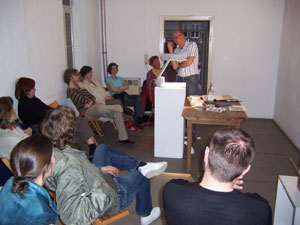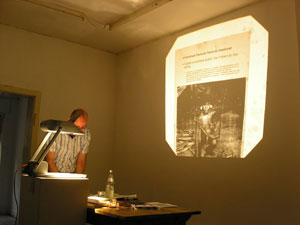Vortrag / Gespräch
Das Problem der absolutistischen Logik in der wirtschaftswissenschaftlichen
Subjekttheorie.
Eine soziologische Analyse zur kognitiven Sozialisation
von männlichen Subjekten in den Wirtschaftswissenschaften
und ihrer gesellschaftspolitischen Bedeutung. (english
text here)




Die
Theorie des Homo Oeconomicus als Medium imaginärer Identitätsbildung
Dr.
Andreas Weber, Wien
29. 4. 2005, 19 Uhr
Die Subjektbildungsprozesse
in der modernen Gesellschaft sind massgeblich von wissenschaftlichen Theorien
abhängig. Deutlich wird dies an dem Programm des Erziehungssystems,
noch deutlicher an dem des Wissenschaftssystems. Eine gesellschaftspolitisch
bedeutende Frage ist es deshalb, mittels welcher wissenschaftlicher Theorien
die kognitiven Sozialisationsprozesse im Erziehungssystem und Wissenschaftssystem
zu strukturieren gesucht werden. Denn in Abhängigkeit von diesen
Theorien lernen die Subjekte die Gesellschaft und sich in ihr zu begreifen.
Vor diesem Hintergrund ist die Auseinandersetzung mit der Theorie des Homo Oeconomicus von soziologischer Relevanz. Denn sie ist die Semantik, die den kognitiven Sozialisationsprozess der potentiellen wirtschaftlichen Modernisierungseliten gegenwärtig dominiert. Dabei fällt zunächst auf, dass das in der Theorie des Homo Oeconomicus zum Ausdruck gebrachte Subjektverständnis sich durch zwei dominante Merkmale kennzeichnet: zum einen nämlich ist der Homo Oeconomicus ein gesellschaftsloses Subjekt, zum anderen ist er sowohl ein körperloses als auch kindheitsloses Subjekt. Mit dem letzten Punkt wiederum hängt zusammen, dass der Homo Oeconomicus als geschlechtsloses Subjekt konzipiert und die Bedeutung geschlechtsspezifischer Sozialisation gänzlich ignoriert werden kann.
Wie absurd dieses Subjektverständnis ist, wird deutlich, wenn man sich vor Augen hält, dass die Theorie des Homo Oeconomicus von körperlich realen Subjekten kognitiv gebildet, in Form von wissenschaftlichen Publikationen semantisch ausbuchstabiert und in Lehrveranstaltungen, Prüfungen oder öffentlichen Podiumsdiskussionen öffentlich kommuniziert wird. Hält man sich des weiteren vor Augen, dass die körperlich realen Subjekte, die die Theorie des Homo Oeconomicus generieren, einen kulturellen Sozialisationsprozess durchlaufen haben und dieser kulturelle Sozialisationsprozess auch eine geschlechtsspezifische Dimension hatte, dann wird ersichtlich, dass in dieser Theorie, um mit Bourdieu zu formulieren, die „Logik der Verkennung“ dominierend ist.
Wenn diese Analyse aber richtig ist, dann stellt sich als weitere wichtige Frage, warum sich die „Logik der Verkennung“ in einem gesellschaftlichen Teilsystem, nämlich dem wissenschaftlichen, in dem es programmatisch um die Generierung von sachhaltigen Erkenntnissen geht, mit einer doch erstaunlichen Hartnäckigkeit erhalten kann. Warum wollen die männlichen Subjekte in den Wirtschaftswissenschaften nicht vom Absolutismus eines gesellschaftslosen und kindheitslosen Homo Oeconomicus Abschied nehmen und ein prozesslogisches Denken in der wirtschaftswissenschaftlichen Theoriebildung durchsetzen, das den gesellschaftlichen und ontogenetischen Bedingungen empirischer Subjektbildung systematisch Rechnung zu tragen vermag? Kann es sein, dass dieser Widerstand mit einer Angst zu tun hat, nämlich der Angst, sich zu verlieren, und zwar im eigenen Denken zu verlieren? Doch wie kann man sich im Denken verlieren? Oder genauer: Wen oder was kann man verlieren, dass die Angst so gross ist, sich vom Phantasma des Homo Oeconomicus zu lösen?
In diesem Beitrag wird der Versuch unternommen, die oben umrissenen Fragen zu klären, insbesondere aber die Theorie des Homo Oeconomicus als Medium imaginärer Identitätsbildung im wirtschaftswissenschaftlichen Kontext zu untersuchen. Dies soll in vier Schritten geleistet werden. Wird in einem ersten Schritt dargelegt, dass es in der Moderne, insbesondere der wissenschaftlichen, möglich wird, ein ontologisches durch ein prozesslogisches Denken zu ersetzen (Bourdieu, Dux), wird es in einem zweiten darum gehen, die Ambivalenzen moderner Subjektbildung im Allgemeinen und männlicher Subjektbildung im Besonderen in ihrer kognitiven, pragmatischen und somatischen Dimension zu explizieren. Dabei soll deutlich gemacht werden, dass die spezifischen Ambivalenzen männlicher Subjektbildung sich durch einen geschichtlich neuartigen Machtverlust (Bourdieu) charakterisieren lassen. Er manifestiert in kognitiver, pragmatischer als auch somatischer Dimension. Die männlichen Subjekte erleben diesen Machtverlust oftmals als beängstigend und auch beschämend, was in erster Linie mit konventionellen geschlechtsspezifischen Sozialisationsprozeduren sowie den damit verbundenen geschlechtsspezifischen Traumatisierungen zu tun hat. Gleichzeitig ist der Verlust männlicher Macht aber nicht nur riskant, sondern auch mit der neuartigen Chance verbunden, wieder einen Zugang zu Ebenen der Subjektivität zu erlangen, die in einem konventionellen Geschlechterverständnis als „unmännlich“ galten und tabuisiert waren.
Im Anschluss an diese subjektsoziologische Perspektivierung wird es in einem nächsten Schritt darum gehen, die Ambivalenzen männlicher Subjektbildung im wirtschaftswissenschaftlichen Kontext zu explizieren. Die These lautet, dass sich in den Wirtschaftswissenschaften – wider aller Deregulierungseuphorie – ein konventioneller Modus männlicher Subjektbildung erhalten hat und auch: zu erhalten gesucht wird. Zu erkennen ist dies an der Instrumentalisierung des Körpers, der sozialen Anderen wie des Denkens zugunsten der Maximierung beruflicher Organisationskompetenzen und Karrieremöglichkeiten, also: von Macht. Die latente Funktion der Theorie des Homo Oeconomicus ist es dabei, diesen konventionellen Modus männlicher Identitätsbildung wissenschaftlich zu legitimieren, und zwar in einer verabsolutierenden Weise. Dies lässt die Theorie des Homo Oeconomicus auch zum Medium imaginärer, die Ambivalenzen moderner Subjektbildung strukturell verkennenden Identitätsbildung werden. Die Ambivalenzen, die mit einer konventionellen männlichen Subjektbildung einhergehen, sind allerdings empirisch real. Wie real, wird paradoxerweise gerade an dem Widerstand ersichtlich, den die wirtschaftswissenschaftlichen Subjekte an den Tag legen, wenn es darum geht, sich vom Absolutismus des Homo Oeconomicus zu lösen.
In einem letzten Schritt schließlich sollen die kulturellen Auseinandersetzungen um das Verständnis der Subjekte in der Moderne hinsichtlich ihrer gesellschaftspolitischen Implikationen diskutiert werden. Die These lautet, dass Theorien in der kulturellen Moderne ein zentrales Medium im „Kampf um Anerkennung“ (Honneth) von lebenskulturell bedeutsamen Bedürfnissen und Interessen darstellen. Während es den Vertretern der Theorie des Homo Oeconomicus darum geht, mit der Autorität der Wissenschaften im Rücken einen konventionellen Modus männlicher Subjektbildung in der kulturellen Moderne als normatives Leitbild zu verankern, regt sich in vielen kulturellen Kontext der modernen Gesellschaft Widerstand: In Kunst, Literatur, aber auch in weiten Teilen der Sozialwissenschaften genauso wie in soziokulturellen Gruppen und Organisationen werden die Ambivalenzen moderner, und das heißt: der eigenen Subjektbildung nicht ignoriert, sondern offensiv reflektiert und in der Folge auch politisiert. Denn ob die Subjekte die Chance haben, die modernen Ambivalenzen in einer würdevollen Weise zu bewältigen, hängt maßgeblich von den Bedingungen ab, unter denen sie agieren. Genau diese Bedingungen werden aber politisch gestaltet.
Vor diesem Hintergrund ist die Auseinandersetzung mit der Theorie des Homo Oeconomicus von soziologischer Relevanz. Denn sie ist die Semantik, die den kognitiven Sozialisationsprozess der potentiellen wirtschaftlichen Modernisierungseliten gegenwärtig dominiert. Dabei fällt zunächst auf, dass das in der Theorie des Homo Oeconomicus zum Ausdruck gebrachte Subjektverständnis sich durch zwei dominante Merkmale kennzeichnet: zum einen nämlich ist der Homo Oeconomicus ein gesellschaftsloses Subjekt, zum anderen ist er sowohl ein körperloses als auch kindheitsloses Subjekt. Mit dem letzten Punkt wiederum hängt zusammen, dass der Homo Oeconomicus als geschlechtsloses Subjekt konzipiert und die Bedeutung geschlechtsspezifischer Sozialisation gänzlich ignoriert werden kann.
Wie absurd dieses Subjektverständnis ist, wird deutlich, wenn man sich vor Augen hält, dass die Theorie des Homo Oeconomicus von körperlich realen Subjekten kognitiv gebildet, in Form von wissenschaftlichen Publikationen semantisch ausbuchstabiert und in Lehrveranstaltungen, Prüfungen oder öffentlichen Podiumsdiskussionen öffentlich kommuniziert wird. Hält man sich des weiteren vor Augen, dass die körperlich realen Subjekte, die die Theorie des Homo Oeconomicus generieren, einen kulturellen Sozialisationsprozess durchlaufen haben und dieser kulturelle Sozialisationsprozess auch eine geschlechtsspezifische Dimension hatte, dann wird ersichtlich, dass in dieser Theorie, um mit Bourdieu zu formulieren, die „Logik der Verkennung“ dominierend ist.
Wenn diese Analyse aber richtig ist, dann stellt sich als weitere wichtige Frage, warum sich die „Logik der Verkennung“ in einem gesellschaftlichen Teilsystem, nämlich dem wissenschaftlichen, in dem es programmatisch um die Generierung von sachhaltigen Erkenntnissen geht, mit einer doch erstaunlichen Hartnäckigkeit erhalten kann. Warum wollen die männlichen Subjekte in den Wirtschaftswissenschaften nicht vom Absolutismus eines gesellschaftslosen und kindheitslosen Homo Oeconomicus Abschied nehmen und ein prozesslogisches Denken in der wirtschaftswissenschaftlichen Theoriebildung durchsetzen, das den gesellschaftlichen und ontogenetischen Bedingungen empirischer Subjektbildung systematisch Rechnung zu tragen vermag? Kann es sein, dass dieser Widerstand mit einer Angst zu tun hat, nämlich der Angst, sich zu verlieren, und zwar im eigenen Denken zu verlieren? Doch wie kann man sich im Denken verlieren? Oder genauer: Wen oder was kann man verlieren, dass die Angst so gross ist, sich vom Phantasma des Homo Oeconomicus zu lösen?
In diesem Beitrag wird der Versuch unternommen, die oben umrissenen Fragen zu klären, insbesondere aber die Theorie des Homo Oeconomicus als Medium imaginärer Identitätsbildung im wirtschaftswissenschaftlichen Kontext zu untersuchen. Dies soll in vier Schritten geleistet werden. Wird in einem ersten Schritt dargelegt, dass es in der Moderne, insbesondere der wissenschaftlichen, möglich wird, ein ontologisches durch ein prozesslogisches Denken zu ersetzen (Bourdieu, Dux), wird es in einem zweiten darum gehen, die Ambivalenzen moderner Subjektbildung im Allgemeinen und männlicher Subjektbildung im Besonderen in ihrer kognitiven, pragmatischen und somatischen Dimension zu explizieren. Dabei soll deutlich gemacht werden, dass die spezifischen Ambivalenzen männlicher Subjektbildung sich durch einen geschichtlich neuartigen Machtverlust (Bourdieu) charakterisieren lassen. Er manifestiert in kognitiver, pragmatischer als auch somatischer Dimension. Die männlichen Subjekte erleben diesen Machtverlust oftmals als beängstigend und auch beschämend, was in erster Linie mit konventionellen geschlechtsspezifischen Sozialisationsprozeduren sowie den damit verbundenen geschlechtsspezifischen Traumatisierungen zu tun hat. Gleichzeitig ist der Verlust männlicher Macht aber nicht nur riskant, sondern auch mit der neuartigen Chance verbunden, wieder einen Zugang zu Ebenen der Subjektivität zu erlangen, die in einem konventionellen Geschlechterverständnis als „unmännlich“ galten und tabuisiert waren.
Im Anschluss an diese subjektsoziologische Perspektivierung wird es in einem nächsten Schritt darum gehen, die Ambivalenzen männlicher Subjektbildung im wirtschaftswissenschaftlichen Kontext zu explizieren. Die These lautet, dass sich in den Wirtschaftswissenschaften – wider aller Deregulierungseuphorie – ein konventioneller Modus männlicher Subjektbildung erhalten hat und auch: zu erhalten gesucht wird. Zu erkennen ist dies an der Instrumentalisierung des Körpers, der sozialen Anderen wie des Denkens zugunsten der Maximierung beruflicher Organisationskompetenzen und Karrieremöglichkeiten, also: von Macht. Die latente Funktion der Theorie des Homo Oeconomicus ist es dabei, diesen konventionellen Modus männlicher Identitätsbildung wissenschaftlich zu legitimieren, und zwar in einer verabsolutierenden Weise. Dies lässt die Theorie des Homo Oeconomicus auch zum Medium imaginärer, die Ambivalenzen moderner Subjektbildung strukturell verkennenden Identitätsbildung werden. Die Ambivalenzen, die mit einer konventionellen männlichen Subjektbildung einhergehen, sind allerdings empirisch real. Wie real, wird paradoxerweise gerade an dem Widerstand ersichtlich, den die wirtschaftswissenschaftlichen Subjekte an den Tag legen, wenn es darum geht, sich vom Absolutismus des Homo Oeconomicus zu lösen.
In einem letzten Schritt schließlich sollen die kulturellen Auseinandersetzungen um das Verständnis der Subjekte in der Moderne hinsichtlich ihrer gesellschaftspolitischen Implikationen diskutiert werden. Die These lautet, dass Theorien in der kulturellen Moderne ein zentrales Medium im „Kampf um Anerkennung“ (Honneth) von lebenskulturell bedeutsamen Bedürfnissen und Interessen darstellen. Während es den Vertretern der Theorie des Homo Oeconomicus darum geht, mit der Autorität der Wissenschaften im Rücken einen konventionellen Modus männlicher Subjektbildung in der kulturellen Moderne als normatives Leitbild zu verankern, regt sich in vielen kulturellen Kontext der modernen Gesellschaft Widerstand: In Kunst, Literatur, aber auch in weiten Teilen der Sozialwissenschaften genauso wie in soziokulturellen Gruppen und Organisationen werden die Ambivalenzen moderner, und das heißt: der eigenen Subjektbildung nicht ignoriert, sondern offensiv reflektiert und in der Folge auch politisiert. Denn ob die Subjekte die Chance haben, die modernen Ambivalenzen in einer würdevollen Weise zu bewältigen, hängt maßgeblich von den Bedingungen ab, unter denen sie agieren. Genau diese Bedingungen werden aber politisch gestaltet.
copyright Andreas Weber
http://www.genderstudies.unizh.ch/
http://www.wu-wien.ac.at/
english:
The Theory of Homo Oeconomicus as a Medium of imaginary Identity Formation
A sociological analysis of cognitive socialisation of male subjects in economic sciences and its sociopolitical importance
In modern society the process of ontogenetic subject formation is significantly dependent on scientific theories. This becomes obvious with regard to the program of educational systems, but even more with regard to the program of scientific system. On this account we assume that it is of sociopolitical importance on what kind of basis the process of cognitive socialisation is organized in educational and scientific system. Because on the basis of these theories the pupils und students learn to understand the system of modern society and their own situation within this system.
Against this background the analysis of the theory of Homo Oeconomicus is of sociological as well as political importance. Because it is the theory which dominates the cognitive socialisation of the coming elites in economy and society. Thereby it strikes that the subject understanding of the theory of Homo Oeconomicus is characterized by two central aspects: on the one hand the Homo Oeconomicus is a subject without society; on the other hand it is a subject without body as well as childhood. With the last point another problem is connected, namely that the Homo Oeconomicus has no gender what implies the consequence that the importance of gender-specific socialisation can be ignored systematically. How absurd this understanding of subjectivity is becomes obvious if we face the fact that the theory of Homo Oeconomicus as every other theory as well is cognitively constructed and communicated in courses, lectures, examinations and public discussion meetings by empirically real existing scientists. If we furthermore become aware that the male scientists generating the theory of Homo Oeconomicus passed through a process of cultural socialisation with a gender-specific structuring than it becomes evident that the “logic of misjudgement” (Bourdieu) is dominating in this theory.
If this analysis is sound the question becomes important why the “logic of misjudgement” (Bourdieu) can persist with such an astonishing pertinacity in a subsystem of modern society, namely the scientific, which has the function realistically to reconstruct the construction of the world: the natural, social and psychic world. Why the male subjects in economic sciences don’t like to disengage from the absolutist logic of homo oeconomicus and alternate to a processlogical thinking in order to reconstruct the ontogenetic and historic process of subject formation in society and economy systematically? Is it possible that this resistance has something to do with the fear to loose oneself, namely to loose oneself in own thought? But how is it possible to loose oneself in thought, more precisely: what or who can be lost that the fear is such immense to leave the phantasm of Homo Oeconomicus?
In this contribution we try to clarify these questions, what means in the first instance: we analyze the logic of Homo Oeconomicus’ theory of and its function as a medium of imaginary identity formation in economic sciences. We intend to attain this goal in four steps. Firstly we like to set out an epistemologically as well as methodologically important problem: namely the transformation of the logic of understanding of the world in the process of modernization. Following the argumentation of Günter Dux and Pierre Bourdieu we will set out that people’s world understanding which was determined by an ontological thinking in premodern societies, in modern society is going to be replaced by a processlogical thinking. Many scientists have meanwhile understood the epistemological importance of this cognitive development and have accepted that the processual logic is the logic of modern age and therefore also the precondition of cultural modernity. In a second step we aim to explain the general ambivalences of subject formation in modern society and the specific of male subject formation in its cognitive, pragmatic and somatic dimension. Thereby we like to make clear that the specific ambivalences of male subject formation have their basis in a historically novel loss of power. Men experience this loss of power often as frightening as well as embarrassing what is primarily due to conventional gender socialisation and the traumatizations connected with it. However, the loss of power is not only risky but also implies the chance again to get in contact with ontogenetically former stages of subjectivity considered as “unmale” in a conventional understanding of gender relations.
Following this subject-sociological perspective the next step deals with reconstructing the ambivalences of modern subject formation in economic sciences. Our assumption is that a conventional mode of subject formation – against all euphoria of deregulation – has been continued, even more: is tried to be continued in economic sciences. This becomes especially obvious at the instrumentalization of the body increasing the professional competences and career opportunities. At this the latent function of the theory of Homo Oeconomicus consists in legitimating a conventional mode of male identity formation, namely in an absolutizing way. This is also the reason why this theory could start a formidable career as a medium of imaginary, the ambivalences of modern subject formation systematically ignoring, identity formation. Nevertheless, that the ambivalences of modern subject formation are empirically existing becomes evident with the resistance of economics’ scientists to leave the absolutism of Homo Oeconomicus.
Finally we aim to discuss the cultural debates concerning the “right” understanding of human being in modern age with regard to their socio-political implications. Here we assume that theories in the cultural world of modern age are a important medium in the “fight for appreciation” (Honneth) of basic wants and culturally formed interests. While the agents of the theory of Homo Oeconomicus are trying to set a conventional mode of male subject formation in the cultural system of modern society as normative model in stone resistance is budging: in art, literature, but also in wide parts of social sciences as well as societal groups and organisations the ambivalences of modern, and that means: of our own subject formation are not ignored any longer but offensively considered and in the consequence also politicized. Than whether the subjects will have the chance to handle the modern ambivalences is crucially dependent on the conditions under which they live. Exactly these conditions are politically organised.
The Theory of Homo Oeconomicus as a Medium of imaginary Identity Formation
A sociological analysis of cognitive socialisation of male subjects in economic sciences and its sociopolitical importance
In modern society the process of ontogenetic subject formation is significantly dependent on scientific theories. This becomes obvious with regard to the program of educational systems, but even more with regard to the program of scientific system. On this account we assume that it is of sociopolitical importance on what kind of basis the process of cognitive socialisation is organized in educational and scientific system. Because on the basis of these theories the pupils und students learn to understand the system of modern society and their own situation within this system.
Against this background the analysis of the theory of Homo Oeconomicus is of sociological as well as political importance. Because it is the theory which dominates the cognitive socialisation of the coming elites in economy and society. Thereby it strikes that the subject understanding of the theory of Homo Oeconomicus is characterized by two central aspects: on the one hand the Homo Oeconomicus is a subject without society; on the other hand it is a subject without body as well as childhood. With the last point another problem is connected, namely that the Homo Oeconomicus has no gender what implies the consequence that the importance of gender-specific socialisation can be ignored systematically. How absurd this understanding of subjectivity is becomes obvious if we face the fact that the theory of Homo Oeconomicus as every other theory as well is cognitively constructed and communicated in courses, lectures, examinations and public discussion meetings by empirically real existing scientists. If we furthermore become aware that the male scientists generating the theory of Homo Oeconomicus passed through a process of cultural socialisation with a gender-specific structuring than it becomes evident that the “logic of misjudgement” (Bourdieu) is dominating in this theory.
If this analysis is sound the question becomes important why the “logic of misjudgement” (Bourdieu) can persist with such an astonishing pertinacity in a subsystem of modern society, namely the scientific, which has the function realistically to reconstruct the construction of the world: the natural, social and psychic world. Why the male subjects in economic sciences don’t like to disengage from the absolutist logic of homo oeconomicus and alternate to a processlogical thinking in order to reconstruct the ontogenetic and historic process of subject formation in society and economy systematically? Is it possible that this resistance has something to do with the fear to loose oneself, namely to loose oneself in own thought? But how is it possible to loose oneself in thought, more precisely: what or who can be lost that the fear is such immense to leave the phantasm of Homo Oeconomicus?
In this contribution we try to clarify these questions, what means in the first instance: we analyze the logic of Homo Oeconomicus’ theory of and its function as a medium of imaginary identity formation in economic sciences. We intend to attain this goal in four steps. Firstly we like to set out an epistemologically as well as methodologically important problem: namely the transformation of the logic of understanding of the world in the process of modernization. Following the argumentation of Günter Dux and Pierre Bourdieu we will set out that people’s world understanding which was determined by an ontological thinking in premodern societies, in modern society is going to be replaced by a processlogical thinking. Many scientists have meanwhile understood the epistemological importance of this cognitive development and have accepted that the processual logic is the logic of modern age and therefore also the precondition of cultural modernity. In a second step we aim to explain the general ambivalences of subject formation in modern society and the specific of male subject formation in its cognitive, pragmatic and somatic dimension. Thereby we like to make clear that the specific ambivalences of male subject formation have their basis in a historically novel loss of power. Men experience this loss of power often as frightening as well as embarrassing what is primarily due to conventional gender socialisation and the traumatizations connected with it. However, the loss of power is not only risky but also implies the chance again to get in contact with ontogenetically former stages of subjectivity considered as “unmale” in a conventional understanding of gender relations.
Following this subject-sociological perspective the next step deals with reconstructing the ambivalences of modern subject formation in economic sciences. Our assumption is that a conventional mode of subject formation – against all euphoria of deregulation – has been continued, even more: is tried to be continued in economic sciences. This becomes especially obvious at the instrumentalization of the body increasing the professional competences and career opportunities. At this the latent function of the theory of Homo Oeconomicus consists in legitimating a conventional mode of male identity formation, namely in an absolutizing way. This is also the reason why this theory could start a formidable career as a medium of imaginary, the ambivalences of modern subject formation systematically ignoring, identity formation. Nevertheless, that the ambivalences of modern subject formation are empirically existing becomes evident with the resistance of economics’ scientists to leave the absolutism of Homo Oeconomicus.
Finally we aim to discuss the cultural debates concerning the “right” understanding of human being in modern age with regard to their socio-political implications. Here we assume that theories in the cultural world of modern age are a important medium in the “fight for appreciation” (Honneth) of basic wants and culturally formed interests. While the agents of the theory of Homo Oeconomicus are trying to set a conventional mode of male subject formation in the cultural system of modern society as normative model in stone resistance is budging: in art, literature, but also in wide parts of social sciences as well as societal groups and organisations the ambivalences of modern, and that means: of our own subject formation are not ignored any longer but offensively considered and in the consequence also politicized. Than whether the subjects will have the chance to handle the modern ambivalences is crucially dependent on the conditions under which they live. Exactly these conditions are politically organised.